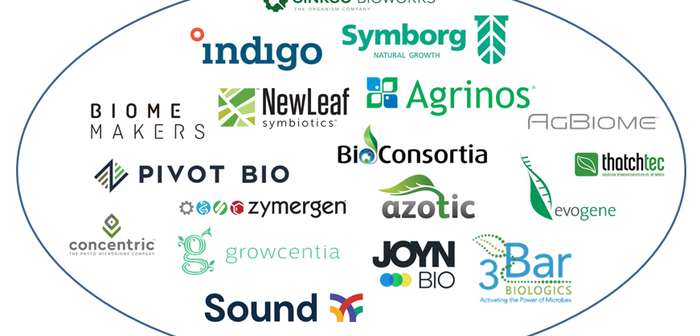Plants host complex communities of microbes, which can have a significant impact on crop yields and quality, both positively and negatively. Until recently, it was generally believed that almost all microbes were detrimental or neutral to plant life. However, scientists are now beginning to understand the hugely positive impact that the plant’s “microbiome”, i.e. the microbes living in and around the plant, can have and how it can be manipulated to improve yields, fight pests and boost crop quality. Industry is not far behind, and the market for agricultural microbiological products is growing rapidly.
Microbes can be formulated into a wide range of different products that could be useful in agriculture, including biostimulants, biopesticides and biofertilizers. As biofertilizers/biostimulants, microbials can be used to enhance nutrient uptake from the soil and improve resilience to drought and disease. Microbes can also make effective biopesticides, either as pathogens that target certain pests, by training the plant’s immune system, or by establishing a large population that outcompetes potential problematic microbes.
Several innovative companies are making strides in developing microbial treatments for plants. Pivot Bio, a Californian company with $186.7 million in investor funding is engineering natural nitrogen-fixing bacteria that live on the roots of corn plants that can boost yields while reducing the need for synthetic fertilizers. Bayer-Gingko Bioworks joint venture Joyn Bio is going one step further, using synthetic biology to create new microbes that can deliver almost anything to a plant. Other companies, such as Concentric Agriculture and BioConsortia, believe that combinations of microbes are key to unlocking the potential of the microbiome.
However, the industry is facing challenges. Although microbes have major potential to boost crop yields if used properly, products can be difficult to develop. Understanding how a new microbe will impact the extremely complex microbial ecosystem around a plant is challenging, as is predicting how a microbe will respond to a specific soil environment. Formulating products and keeping the microbes alive for a long period of time can also be difficult.
“Biostimulants and Biopesticides 2021-2031: Technologies, Markets and Forecasts”, a new report from IDTechEx, explores how companies are overcoming these challenges and beginning to unlock the true potential of the plant microbiome. The report features profiles and analysis of the main players in the sector, alongside an evaluation of the technical and market factors that could make or break this budding industry.
Upcoming Webinar
IDTechEx are hosting a free webinar on this topic on Tuesday 13th October – Biostimulants: Navigating a Crowded Market Place. This webinar, presented by IDTechEx Technology Analyst Dr Michael Dent, introduces biostimulants and discusses the regulatory and market factors that could be key to the success of this fledgling industry.
It will include:
- An introduction to agricultural biologicals and biostimulants.
- An overview of the biostimulants industry.
- A discussion of the global regulatory landscape for biostimulants and its implications for the industry.
- An analysis of the industry outlook for the next ten years of biostimulants.
Click here to register your place on one of our three sessions.




